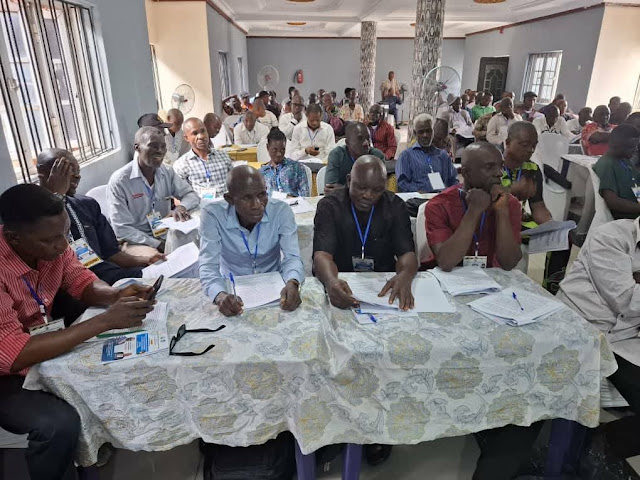In a bold move to revolutionize Nigeria’s healthcare landscape, President Bola Ahmed Tinubu has issued a directive to enforce mandatory health insurance across all Ministries, Extra-Ministerial Departments, and Agencies (MDAs) in line with the National Health Insurance Act of 2022. This directive, announced through a Statehouse press release on September 3, 2025, by Bayo Onanuga, Special Adviser to the President on Information and Strategy, underscores the administration’s commitment to expanding health coverage, safeguarding workers, reducing out-of-pocket healthcare expenses, and fostering accountability in both public and private sector engagements. The directive, which is both far-reaching and transformative, is poised to address longstanding gaps in Nigeria’s healthcare system while ensuring compliance with the legal framework established by the NHIA Act.
The Directive: A Comprehensive Approach to Health Insurance
President Tinubu’s directive, conveyed through a service-wide circular to be issued by the Secretary to the Government of the Federation (SGF), outlines five critical areas aimed at institutionalizing mandatory health insurance across the public sector and beyond. These measures are designed to align with the provisions of the National Health Insurance Act, 2022, which mandates compulsory health insurance for all Nigerians and tasks the National Health Insurance Authority (NHIA) with achieving universal health coverage.
1. Mandatory Enrollment of MDA Employees in NHIA Plans
The first pillar of the directive requires all MDAs to enroll their employees in the NHIA’s health insurance plan. This step is pivotal in ensuring that public sector workers, who form a significant portion of Nigeria’s workforce, have access to affordable and reliable healthcare services. By mandating enrollment, the government aims to reduce the financial burden of medical expenses on civil servants, many of whom have historically relied on out-of-pocket payments to access healthcare.
Furthermore, the directive allows MDAs the flexibility to opt for supplementary private insurance coverage where desired, provided it complies with the NHIA Act. This provision acknowledges the diversity of healthcare needs and preferences within the public sector while ensuring that the baseline requirement of NHIA enrollment is met. It also reflects a pragmatic approach to balancing public and private sector contributions to healthcare financing.
2. Health Insurance Certificate as a Prerequisite for Public Procurement
The second key area of the directive introduces a stringent requirement for entities participating in public procurement processes. All organizations, whether public or private, must present a valid NHIA-issued Health Insurance Certificate as part of their eligibility documentation. This certificate serves as proof of compliance with the mandatory health insurance requirement and is now a condition precedent for engaging in any procurement-related activities with the government.
This measure is a strategic effort to embed health insurance compliance within the broader framework of public sector accountability. By linking health insurance to procurement eligibility, the government is leveraging its significant purchasing power to drive compliance across industries. This move is expected to incentivize private sector organizations to enroll their employees in health insurance schemes, thereby expanding coverage beyond the public sector.
3. Health Insurance Certificates for Licenses and Permits
In a similar vein, the directive mandates that all MDAs require applicants for licenses, permits, and other official approvals to present valid NHIA Health Insurance Certificates. This requirement applies to both individuals and organizations seeking to obtain or renew such approvals. By integrating health insurance compliance into regulatory processes, the government is signaling its intent to make health insurance a cornerstone of civic and corporate responsibility.
This provision is particularly significant in a country where regulatory compliance is often a prerequisite for business operations. By tying health insurance to licenses and permits, the directive creates a powerful incentive for businesses and individuals to prioritize healthcare coverage, thereby contributing to the broader goal of universal health coverage.
4. Digital Platform for Certificate Verification
To ensure transparency and efficiency in the implementation of these measures, the directive mandates the NHIA to establish a digital platform for the verification of Health Insurance Certificates. This platform will enable MDAs, regulatory bodies, and other stakeholders to easily confirm the authenticity of submitted certificates. The introduction of a digital verification system is a forward-thinking step that aligns with global best practices in governance and technology.
The digital platform is expected to streamline compliance monitoring, reduce bureaucratic bottlenecks, and minimize opportunities for fraud or misrepresentation. By leveraging technology, the NHIA can ensure that the verification process is accessible, transparent, and efficient, thereby fostering public trust in the health insurance system.
5. Internal Procedures for Compliance Monitoring
The final component of the directive requires all MDAs to collaborate with the NHIA to develop internal procedures for verifying the authenticity of Health Insurance Certificates and ensuring consistent compliance. This provision underscores the importance of institutional accountability and capacity building within the public sector. By establishing clear guidelines and processes, MDAs will be better equipped to enforce the directive and monitor compliance effectively.
This collaborative approach also highlights the NHIA’s role as a central coordinating body in the implementation of mandatory health insurance. By working closely with MDAs, the NHIA can provide technical support, share best practices, and address challenges that may arise during the implementation process.
Balancing Public and Private Sector Interests
While the directive is unequivocal in its commitment to enforcing mandatory health insurance, President Tinubu has also called for constructive engagement with the private sector to ensure that businesses are not unduly constrained by the new requirements. This acknowledgment reflects a nuanced understanding of the economic realities facing Nigerian businesses, particularly small and medium-sized enterprises (SMEs), which may face challenges in complying with mandatory health insurance.
The call for engagement suggests that the government is open to dialogue with private sector stakeholders to address concerns, provide clarity on implementation, and explore potential support mechanisms. This approach is critical to ensuring that the directive achieves its objectives without stifling economic activity or imposing excessive burdens on businesses.
The Broader Context: Nigeria’s Healthcare Challenges
The directive comes at a critical juncture in Nigeria’s healthcare journey. Despite recent progress in the health sector, national health insurance coverage remains alarmingly low, three years after the enactment of the NHIA Act in 2022. The Act, which replaced the National Health Insurance Scheme (NHIS) with the more robust NHIA, was designed to achieve universal health coverage by making health insurance compulsory for all Nigerians. However, implementation challenges, including limited awareness, inadequate funding, and logistical constraints, have hindered progress.
Nigeria’s healthcare system has long been plagued by systemic issues, including underfunded public health facilities, a shortage of healthcare professionals, and a heavy reliance on out-of-pocket payments. According to the World Health Organization, out-of-pocket health expenditure in Nigeria accounts for over 70% of total health spending, one of the highest rates in the world. This financial burden disproportionately affects low-income households, exacerbating poverty and limiting access to essential healthcare services.
The low penetration of health insurance has also contributed to disparities in healthcare access, with rural and underserved populations facing the greatest barriers. By mandating health insurance across MDAs and linking compliance to procurement and regulatory processes, President Tinubu’s directive aims to address these challenges head-on, creating a ripple effect that could transform the healthcare landscape.
The Goals of the Directive
The presidential directive is anchored on several key objectives, each of which aligns with the broader goals of the NHIA Act:
Expanding Health Coverage: By mandating enrollment for public sector workers and incentivizing compliance in the private sector, the directive seeks to significantly increase the number of Nigerians covered by health insurance. This is a critical step toward achieving universal health coverage, a goal that has eluded Nigeria for decades.
Safeguarding Workers: Ensuring that public sector employees have access to health insurance protects them from the financial risks associated with medical emergencies. This measure also enhances worker productivity and morale, as employees can focus on their duties without the constant worry of healthcare costs.
Reducing Out-of-Pocket Expenditures: By shifting the burden of healthcare financing from individuals to insurance schemes, the directive aims to reduce out-of-pocket spending, which is a major driver of poverty in Nigeria. This aligns with global health financing trends that prioritize risk pooling and prepayment mechanisms.
Promoting Accountability: The integration of health insurance requirements into procurement and regulatory processes introduces a new level of accountability in public and private sector engagements. This ensures that compliance with health insurance is not optional but a fundamental requirement for participation in government-related activities.
Implications for the Private Sector
While the directive primarily targets MDAs, its implications for the private sector are profound. Businesses that engage in public procurement or require licenses and permits will need to prioritize health insurance compliance to remain eligible. This could lead to a significant increase in private sector participation in health insurance schemes, particularly among large corporations and government contractors.
However, the directive’s impact on SMEs and informal sector workers remains a critical consideration. Many small businesses operate on tight margins and may struggle to afford health insurance for their employees. To address this, the government may need to explore subsidies, tax incentives, or other support mechanisms to ease the transition for smaller enterprises.
The call for constructive engagement with the private sector is a positive step in this direction. By fostering dialogue, the government can identify and address potential barriers to compliance, ensuring that the directive achieves its objectives without disproportionately affecting vulnerable businesses.
The Role of Technology in Implementation
The establishment of a digital platform for certificate verification is a cornerstone of the directive’s implementation strategy. In a country where bureaucratic inefficiencies and fraud have historically undermined policy implementation, the use of technology is a game-changer. The digital platform will not only streamline verification but also enhance transparency and accountability, making it easier for stakeholders to comply with the directive.
Moreover, the platform could serve as a foundation for broader digital health initiatives, such as electronic health records, telemedicine, and data-driven health policy planning. By investing in digital infrastructure, the NHIA is positioning itself as a forward-thinking institution capable of driving Nigeria’s health sector into the 21st century.
Challenges and Opportunities
While the directive is a significant step forward, its success will depend on effective implementation and stakeholder buy-in. Key challenges include:
Awareness and Education: Many Nigerians, including public sector workers and private sector employers, may be unaware of the NHIA Act or the benefits of health insurance. A robust public awareness campaign will be essential to drive compliance and uptake.
Capacity of the NHIA: The NHIA will need to scale up its operations to accommodate increased enrollment, manage the digital platform, and support MDAs in compliance monitoring. This may require additional funding and human resources.
Private Sector Resistance: Some businesses, particularly SMEs, may resist the new requirements due to cost concerns. The government will need to balance enforcement with support to ensure broad compliance.
Healthcare Infrastructure: Expanding health insurance coverage is only effective if there are sufficient healthcare facilities and providers to meet demand. Investments in healthcare infrastructure and workforce development will be critical to realizing the directive’s full potential.
Despite these challenges, the directive presents significant opportunities. By prioritizing health insurance, the government can reduce the financial burden of healthcare, improve health outcomes, and drive economic productivity. The focus on digital verification also opens the door to broader technological advancements in the health sector, positioning Nigeria as a leader in health system innovation in Africa.
Conclusion
President Tinubu’s directive on mandatory health insurance marks a turning point in Nigeria’s quest for universal health coverage. By targeting MDAs, integrating health insurance into procurement and regulatory processes, and leveraging technology for transparency, the directive addresses critical gaps in the healthcare system while promoting accountability and equity. The emphasis on constructive engagement with the private sector further demonstrates a commitment to inclusive policymaking.
As Nigeria grapples with the challenges of low health insurance coverage and high out-of-pocket expenditures, this directive offers a bold and comprehensive solution. However, its success will depend on robust implementation, stakeholder collaboration, and sustained investment in healthcare infrastructure. If executed effectively, this policy could transform Nigeria’s healthcare landscape, ensuring that all citizens have access to affordable and quality healthcare—a fundamental pillar of a prosperous and equitable society.







